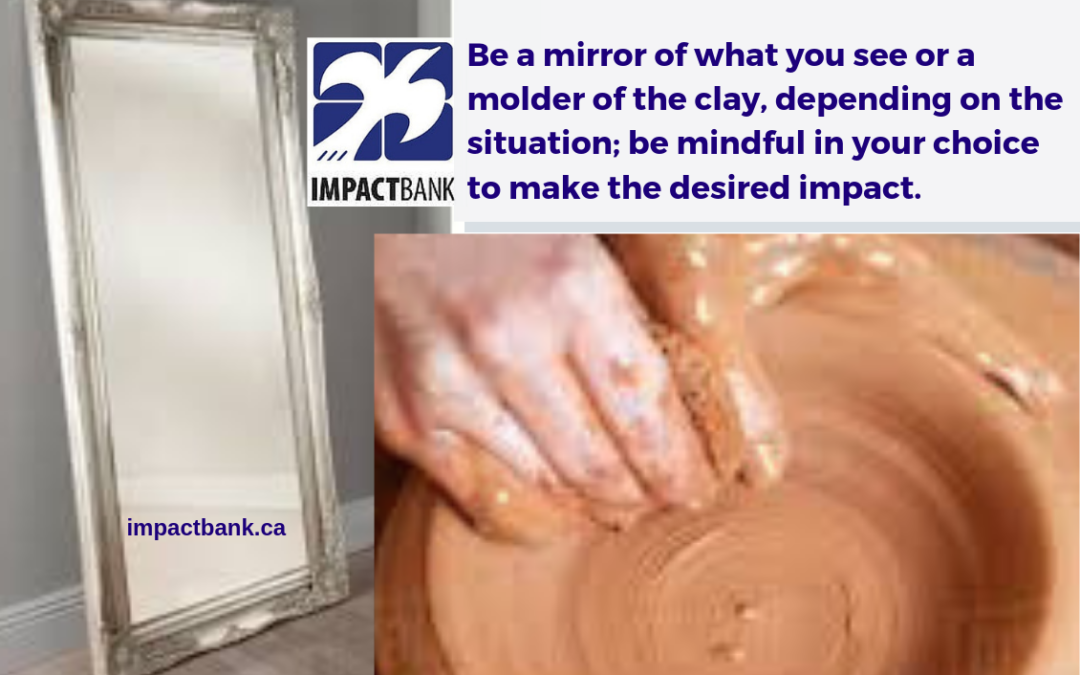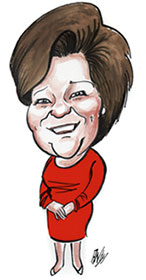Building Relationships and Influencing Growth
It’s easy to influence others when you’re riding the wave of the status quo. Does it last? Is there substance enough to make the impact you seek in the long-run? Building relationships is the purview of the mirror while, the substance needed for growth, that of the molder.
As I write earlier, the molder is one who breaks ground and pushes back on the system. They’re not easily influenced by the crowd. Most importantly they’re quick to take a stand for or against things that matter to them. This can attract and alienate. It really depends on when and how the skill is applied. Getting the right balance and discerning the right time and way to apply this skill requires mindful practice.
Interestingly, it’s just as precarious to tie oneself too closely to being a mirror. The mirror quickly bonds and builds bridges with people making them feel like they are the centre of attention and that their perspective matters. This builds and strengthens relationships and, thereby, loyalty. The mirror brings people and ideas together almost mesmerizing them to see and feel connection. Even weak connections are powerful in these instances. We know it’s an evolutionary function of the brain. It’s the human ability to build tight bonds that moves us to sacrifice for the greater good or at least what those in our tribe accept as such.
Mold the Clay
With the skill to mold, one offers more substance than flash. That sounds, at first hearing, like the desired approach. It has always been mine. Moreover, I ridicule the mirroring types and fail to value and respect this skill. I ran for student body president in my high school. I lost. For years I thought it was because all presidents before me had been boys. Of course, it didn’t help that one of my best friends and campaign supporters admitted after the election that he just couldn’t vote for me in the end, because I’m a “girl”. Most of the student body told me before and after the election that I had the best ideas and surprised them with my ability to craft and deliver a great speech. I had the substance. I was respected but I wasn’t liked.
Those who are really skilled at molding are the people everyone wants to have at their back when facing difficult situations. They’re not the person most want to have a beer with, unless they’re seeking scintillating conversation. Of course, as part of this conversation they must be prepared to hear counter perspectives and sometimes even be comfortable feeling uncomfortable. The molder is thinking out loud and not choosing their words to align and connect, but instead, focused on challenging them self and and the other. The molder can be a difficult person.
Mirror to Connect
One who has the skill to mirror is able to leave everyone they encounter feeling respected and cared about, in the moment. They’re style comes from understanding the Maya Angelou quote, “People won’t remember what you said, people won’t remember what you did, people will always remember how you made them feel.” The young man who challenged me for student body president in high school also got great grades and was equally involved in student activities. He also had the ability to leave people feeling cared about and comfortable with who they are as people. What teenagers doesn’t like that!
The person who is naturally able to mirror-back the values and feelings and thoughts of the other, puts them at-ease. This skill leaves people feeling like they matter and that they’re understood. It’s a great feeling. They’re not the person who will risk their good favour broadly, to support those in trouble. In fact, the mirror may see and reflect back pain or loss while seriously lacking the will, skill and heart to fiercely back-up, even a friend.
Choosing to Mold or Mirror
Being fair to both ends of this spectrum is my goal. Hopefully by declaring my bias I’m landing in a more balanced place. Balance may not be the best word in this situation. Ultimately, it isn’t about landing in the middle. The most appropriate approach is to build the skill to move along the spectrum.
When is it appropriate to be courageous, even fearless? Do we need to be willing to bring a fresh perspective even when it may be unpopular or slow people down?
When is connecting, using the mirror-neurons to build tight meaningful bonds to get things done, the most effective approach?
While every human being is capable of leaning into both sides of this effectively, there is benefit in respecting when a colleague offers the other approach. Learning to adapt and adjust accordingly is a benefit of a diverse team.
Back to the Source
In the podcast episode, I mention the idea for this theme came when reflecting on historian Jon Meacham’s comments about how politicians often neglect substance for connection. Furthermore he argued, they learn to exclusively mirror their constituents to win them over, ultimately blocking them from being bold and courageous when necessary.
Just this week Jane Philpott, a former Federal Cabinet Minister, spoke to an indigenous group about being expelled from the Liberal caucus, along-side her counter-part, Jody Wilson Raybould. Her comments offered a window into some of the impacts we may see when diverse perspectives enter politics. Perhaps we’ll find a significant mirror-molder example here. Dr. Philpott’s comments below.
The political shock waves that hit Ottawa over the SNC Lavelin case have been examined from many angles. One of the underlying lessons that some observers have noted is that there was a serious clash of cultures. In theory there is a desire for diversity among people in politics. In reality it seems that Ottawa is not entirely ready for people who approach leadership and responsibility from different world views. As a result some voices were not heard or were not understood. And some have criticized me, and Jody, as being naive, as not understanding how things are done. Those critics failed to realize that the way things have always been done may not meet the standard of what Canadians expect from their political leaders.
It strikes me that former Ministers Philpott and Wilson Raybould were molders in a world that only understands mirrors. Both must be valued, since when used appropriately, they complement each other. I yearn for the day when politics is truly done differently and bold, courageous leadership is on equal footing with those skilled at mirroring and connecting.
Walk With Me…
In April 2018 I brushed up against a call for meaning; an insight of sorts. It ultimately moved and inspired me to shift the focus of my practice. I’m walking with 30 somethings, who are truly in a pivotal spot in life and career. Whether HERE by age or spirit, I want to walk with these seekers! Seekers who are ready to do some self exploring & find the real meaning of their life? The research suggests people embrace their inner REBEL during their 20’s while most slip quietly and comfortably into ACCOMMODATOR in their 30’s. This documented pattern grabbed my attention and my mission was made clear. Moreover, I’m intent on resurfacing that inner rebel whose perspective, now shaped with more experience, may offer insights many typically miss when they matter most.
In June 2018 I took a course in story telling. I was intent on finding my “Big Why” to help me understanding my purpose for shifting my practice. Ultimately, I landed on my story. It spans from my childhood, with a pivotal point in my early 20’s finally culminating in a significant career turning-point at the age of 37. This story revealed an unhealthy pattern while illuminating my purpose. In fact, remembering the moment of insight supports my efforts when this transition is difficult. It adds meaning to the work I’m currently doing. Listen below…
Feel like you’re living someone else’s destiny?
Willing to do the work to find more meaning?
Once you have the skills to unpack the emotions and barriers and triggers and mindset challenges with the skills in my BYI system, you’ll begin to see the impact in your career and you’ll find what matters most to you. Join me…
My goal is to make my system accessible and affordable. There are many ways you can engage with me….below you’ll find THREE to get started, without spending a dime.
WALK WITH ME…
- REGISTER for an ASK ROX RoundTable… TWO 50 minute engagements on ZOOM – the second Tuesday and the last Friday of every month – limited to 12 participants in each.
- BOOK a complimentary exploratory conversation 20-30 minutes.
- SUBSCRIBE to my mailing list from my home page, receive an interactive exercise helping you cope with stress, and a weekly reflection.
Of course I’d love to work with you, your team or organization so…
- Book me to speak at your conference or to a group in your organization. My workshops on building resilience, improving relationships, and increasing performance are popular.


